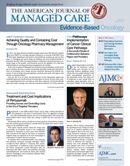- Center on Health Equity & Access
- Clinical
- Health Care Cost
- Health Care Delivery
- Insurance
- Policy
- Technology
- Value-Based Care
Study Supports Feasibility of Routine Molecular Screening of NSCLC in Community Setting
Widespread molecular screening of non—small cell lung cancer (NSCLC) is feasible and can be performed outside of large academic medical centers, according to a multicenter study conducted in Germany that was presented at ASCO 2012.
One of the main drivers of doing such a study was to determine the effectiveness of biomarkers, since many effective treatments for patients with NSCLC are targeted therapies that are most effective in patients with certain mutations. For example, erlotinib (Tarceva) targets the EGFR1 molecule, and crizotinib (Xalkori) targets the ALK gene.
“High quality molecular diagnostics and personalized treatment approaches present a significant benefit for patients,” said Thomas Zander, MD, University Hospital in Cologne, Germany. “At last year’s ASCO meeting, [studies of] large networks for molecular screening testing were presented, which consisted of several highly specialized comprehensive cancer centers spread all over the United States, but it meant that getting access to molecular diagnostics was only available to a minority of patients in this country.”
In order to perform the study, researchers established the Network Genomic Medicine Lung Cancer molecular screening network, which included community hospitals in the Cologne-Bonn region of Germany, where approximately 2.5 million residents could potentially receive screening. Thus far, 1782 samples from residents of the Cologne-Bonn region have been collected. The authors estimate that this accounts for between 60% and 70% of all NSCLC samples in the region. Samples of tumors of patients with lung adenocarcinoma—the most common form of NSCLC—were screened for ALK translocations, mutations in KRAS, EGFR, BRAF, and PIK3CA, and amplification of ERBB2, while squamous cell samples were also screened for FGFR1 amplifications. Of the Cologne-Bonn region samples, Dr Zander reported that approximately 77% of samples were suitable for molecular analysis.
Among the adenocarcinoma samples tested, KRAS mutations were detected in 32% of samples, EGFR mutations were detected in 13% of samples, ALK mutations in 3%, BRAF mutations in 2%, PIK3CA mutations in 2%, and ERBB2 mutations in 2%. The researchers were able to note that in patients with the micropapillary subtype of adenocarcinoma, which accounted for between 30% and 32% of all adenocarcinoma cases identified, EGFR mutations werehighly enriched. Out of the 500 squamous cell samples, 78 were found to have FGFR1 amplifications. The researchers found that approximately 40% of all NSCLC samples collected had tractable lesions.
The molecular screening findings helped the community hospitals determine patient treatment. For example, patients with ALK mutations were given crizotinib, and patients with EGFR mutations were given EGFR-TKI treatment. Additionally, patients were also referred to clinical trials that involved investigational treatments that correlated with the genetic profile of their tumors.
Zander T, Heukamp LC, Bos MCA, et al. Regional screening network for characterization of the molecular epidemiology of non—small cell lung cancer (NSCLC) and implementation of personalized treatment.J Clin Oncol.2012;30(suppl; abstr CRA10529).
Funding Source:None.
Author Disclosure:The author reports no relationship or financial interest with any entity that would pose a conflict of interest with the subject matter of this article.
Authorship Information:Concept and design; drafting of the manuscript; and critical revision of the manuscript for important intellectual content.
Study Supports Feasibility of Routine Molecular Screening of NSCLC in Community Setting

Building Trust: Public Priorities for Health Care AI Labeling
January 27th 2026A Michigan-based deliberative study found strong public support for patient-informed artificial intelligence (AI) labeling in health care, emphasizing transparency, privacy, equity, and safety to build trust.
Read More
Ambient AI Tool Adoption in US Hospitals and Associated Factors
January 27th 2026Nearly two-thirds of hospitals using Epic have adopted ambient artificial intelligence (AI), with higher uptake among larger, not-for-profit hospitals and those with higher workload and stronger financial performance.
Read More
Motivating and Enabling Factors Supporting Targeted Improvements to Hospital-SNF Transitions
January 26th 2026Skilled nursing facilities (SNFs) with a high volume of referred patients with Alzheimer disease and related dementias may work harder to manage care transitions with less availability of resources that enable high-quality handoffs.
Read More
Specialty and Operator Status Influence Electronic Health Record Use Variation
January 22nd 2026Operators demonstrated specialty-specific differences in electronic health record efficiency, timeliness, and after-hours use, highlighting how workflow and training shape documentation behaviors across medical disciplines.
Read More
